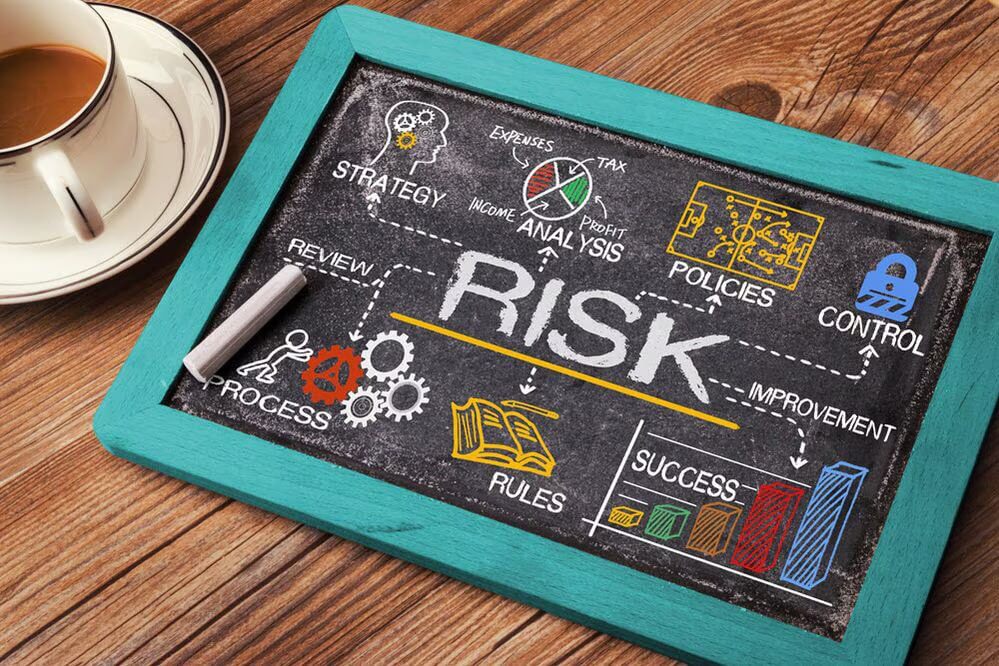The Risks In Entrepreneurship: What You Need To Take To Start Your Journey
For entrepreneurs, dealing with the risks in entrepreneurship requires a variety of special skills and patience. The existence of entrepreneurs who have reached the top in their fields worldwide and our country, and especially the fact that these entrepreneurs have climbed the career and success ladder at an unimaginable speed, makes this subject even more interesting. These success stories drive both academics and practitioners to conduct more in-depth research on what entrepreneurship is and what it is not.
An entrepreneur can be defined as a person who finds a good or service that society needs and therefore is demandable, attempts to produce it, and initiates this with his creativity. The entrepreneur seizes and combines the factors of production, aims for profit, and is ready for the risks in entrepreneurship.
For the business he establishes and therefore his own goal to be achieved, the entrepreneur must be a person who can see the opportunities of the market, sense the changes in people’s demands, and evaluate them. The entrepreneur can also be defined as a person who shows the courage to participate in the market by risking his capital and labor for a business he sees as profitable. Facing the risks in entrepreneurship is a natural result of entrepreneurship.
What Are The Common Risks In Entrepreneurship?

The most common examples of risks in entrepreneurship include financial risks, market risks, operational risks, and local regulatory risks. The scientific and technological advances observed in today’s world have radically changed the production system. This qualitative change also changes the institutions that determine social relations and therefore the concept of Entrepreneurship is changing in this sense.
Based on this, the person who does what is known best and adds his mind to his skills, thinks, analyzes, plans, puts into effect, and implements measures that will use labor and capital resources efficiently under ordinary and extraordinary conditions and can control the results is a creative entrepreneur.
Different characteristics have been defined for successful entrepreneurs in the literature. However, when we examine successful entrepreneurs in general terms; We see that characteristics such as knowing oneself well, courage, self-confidence, ambition to be successful, and determination are common.
Why Are Risks Necessary For Success In Entrepreneurship?
Risk also means profit, so it is necessary. The concept of entrepreneur entered the literature with the entry into the capitalist production process and found its current meaning. Entrepreneurs became the driving force that created the dynamics of society in the transition from feudal structure to industrial society. In short, we can define entrepreneurs as people who bring together the factors of production and initiate the necessary initiative for the production of economic goods and services; and also find the necessary financial resources for production and the markets where production will be evaluated.
Entrepreneurs do not take risks all the time. Because they are not gamblers. They are courageous, but they also act carefully. Being independent is more important than being in another job where they can feel secure, or working under orders. They make an extraordinary effort to be successful. They do not take risks in entrepreneurship for financial interests or to act solely with the profit motive (to make a profit in fashion). They are people who want to realize something unique and to be remembered for what they have accomplished. They are artists who create economic value. Profit is important as an indicator of success regarding the economic values they create.
A successful entrepreneur is determined. Instead of accepting problems as they are, he looks for solutions and does not hesitate to make decisions. After making a decision, he strives to achieve the result and tries to reach the goal. They make the necessary effort for this and know how to listen to those who know and learn what he does not know. A successful entrepreneur is versatile. Rather than staying within certain limits in fulfilling business functions, he accepts being an authority in the management of that business and improving himself in every subject as the basic conditions of a successful entrepreneur and works to achieve this.
How To Evaluate Risks Before Starting A Business?
Before starting an entrepreneurial project, the risks in entrepreneurship should be evaluated. If we consider it on a personal basis, some people are reluctant to take risks in entrepreneurship and prefer to work under the command of others rather than taking responsibility and coming to the forefront. On the contrary, some may choose to be independent, overlap their imagination with reality at one point, and search for a new path. Such people are the ones who change societies. The creative capacity of a person shows itself most in the fields of science and art. The person we call an entrepreneur is, in a way, the person who brings these to economic life, creates added value, and enlarges the pie.
Entrepreneurship means combining personal structure with financial opportunities and resources within a certain environment. Each entrepreneur has a specific structure and all entrepreneurs own and manage their businesses in their way. However, there are also many personal characteristics that they may want to develop to be successful in their businesses. Most people can display entrepreneurial personality structures.
However, only entrepreneurs can use these characteristics to achieve business success. Entrepreneurs are people who have the ability to see and evaluate business opportunities, gather the necessary resources to benefit from them, and take action to achieve success. In order for entrepreneurs to effectively fulfill their roles related to their basic or other functions, a certain value system must prevail in society or this opposing value system (traditional values) must be very weak.
What Financial Risks Do Entrepreneurs Face?
The most common financial risks are cash flow problems due to insufficient capital and loan repayment problems. To cope with these more easily, entrepreneurs are expected to have high financial literacy. The entrepreneur has to break the resistance of those who are attached to tradition because he/she brings the new instead of the old and in some cases the completely unknown new. The entrepreneur sees change as normal and beneficial. As professional economists said, the entrepreneur fulfills the task of creative destruction.
In other words, the entrepreneur creates the new by destroying tradition. To overcome the difficult change, the entrepreneur has to calculate the resistances he/she may encounter both in the production and usage stages and make efforts to overcome them. It is necessary to know the old very well and to be able to explain the features of the new very well. This requires being able to think in many ways, having the power of persuasion to ensure the acceptance of the new, and good communication. The entrepreneur must be able to think independently, be flexible, creative, self-confident, durable, and persistent.
The way entrepreneurs take risks in entrepreneurship is an important type of behavior that affects the added value production process. The determinants of the risk-taking process are the creation and opportunity dimension, real and perceived value, the entrepreneur’s skills and goals, and the suitability and competitive field. When taking risks in entrepreneurship, the entrepreneur should pay attention to issues such as technological change, market structure, public regulations, and type of competition.
How Can Entrepreneurs Manage Business Risks Effectively?

In order to manage business risks more successfully, entrepreneurs need to create a detailed business calendar. It is also not logical and profitable to use all assets in a single project. In addition to diversification, it is also important to continue to follow the market in the process of combating business risks in entrepreneurship.
Opportunities lie at the center of the entrepreneurial process. Opportunity is the gap left by those who already provide services in the market. It represents providing a better service to the customer than the service currently provided. The first step in this process is to identify opportunities.
Entrepreneurs who create innovations with developing technology create new markets with the new products they create. With entrepreneurs breaking away from traditional trade methods and completely adopting new methods, challenging market conditions, and changing the current business culture, SMEs have started to take the lead again in production, competition, creating new jobs, and ensuring social integration, especially in the last twenty years.
While on the one hand, large companies are shrinking to adapt to this change, on the other hand, thanks to creative entrepreneurs, these businesses have started to perform very important functions, especially in emerging new markets. Continuously cheaper information technologies now provide SMEs with the infrastructure to do business on a global scale.
What Are The Legal Risks In Entrepreneurship?
The most common legal risks include contract breaches, copyright issues, tax compliance issues, lack of employee rights, and non-compliance with local conditions. Entrepreneurship aims to benefit from emerging opportunities or to create new opportunities.
In this sense, entrepreneurship is a process aimed at creating and pursuing opportunities, regardless of whether the resources can be controlled or not. Entrepreneurs fulfill many functions economically and socially. With the ever-developing global economy, a new element is added to the functions of entrepreneurs every day.
For this reason, the functions of the modern entrepreneur in particular emerge in different ways. These functions can be expressed as organizing and ensuring production, providing product diversity, creating employment, creating new markets and new sales methods, and providing capital accumulation. Entrepreneurs need to comply with the necessary regulations to successfully manage legal risks, otherwise, it becomes impossible to combat other risks in entrepreneurship.
How Do Market Conditions Affect Entrepreneurial Risk?
The most critical market conditions for entrepreneurs are consumer demand, cost increases, currency fluctuations, and consumer demand rate, which may pose risks in entrepreneurship. The concept of entrepreneurship has been examined by many authors from different perspectives. In the studies conducted, this concept has been tried to be explained by mostly addressing issues such as risk, capital supply, arbitrage, and coordination of production factors. Many authors have identified entrepreneurship with the establishment of small businesses and their management.
Entrepreneurship can be summarized as creating value and contributing to social development by bringing together production factors. Successful entrepreneurs can be of all ages, income levels, races, and genders. However, entrepreneurs’ education and experience levels may vary. However, some studies state that to be a successful entrepreneur, some basic personal characteristics such as creativity, dedication, determination, flexibility, leadership, passion, and self-confidence must be present.
Entrepreneurial thinking has four main components. These are; being innovative and creative, taking risks in entrepreneurship, being a pioneer, and competitive thinking. All these components are extremely important in terms of value creation.
What Personal Risks Should Entrepreneurs Be Prepared For?
I can also remind you of some personal risks for entrepreneurs among the risks in entrepreneurship. When they enter competitive markets, they may encounter many personal risks ranging from financial uncertainty to the disruption of work-life balance. In some special cases, psychological problems and risks ranging from burnout to fear of failure are also observed.
The risk of income instability should not be ignored, especially in the start-up stages of entrepreneurs. Entrepreneurs in almost every sector should also prepare themselves to work under intense stress. This requires patience for all entrepreneurs. Although these types of personal risks seem to be easier to overcome compared to the risks in entrepreneurship, not every entrepreneur may show the same resilience.
For this reason, you should also pay attention to your mental and physical health during the entrepreneurship process. The negative impact on your health may be the most critical risk in this process.
How To Balance Risk And Reward In Entrepreneurship?

Regardless of which area you are an entrepreneur offering a product or service, you must establish a balance between risk and return. To optimize this balance, financial goals and some strategies should be implemented.
If entrepreneurs always avoid high-risk decisions, they may miss out on potential high returns. In order to maintain this balance, entrepreneurs should determine what they can fight between the risks in entrepreneurship. For this, the trial process and feedback are vital. In addition to these, it may be advisable to create a future perspective that encourages growth along with strategies to minimize potential losses.
It is also possible to get professional help to ensure a balance between risk and return. You can benefit from the personal experiences and advice of more experienced entrepreneurs and develop your strategies accordingly. Knowing the market dynamics will give you profitable tips to create a competitive advantage.
How Can Entrepreneurs Build Resilience To Face Risks?
Entrepreneurs need to build resilience to face risks. In order to achieve this, they must first see failures or possible losses as a kind of opportunity and experience. Thousands of investors who fail in the early stages of their ventures suspend their projects. However, very few of them continue on their way without giving up and without getting caught up in losses. Losses in the early stages should be remembered among the risks in entrepreneurship.
In addition to psychological resilience, a supportive network can also be very useful. Entrepreneurs who want to gain resilience against risks can get help from mentors and professional advisors when dealing with the risks in entrepreneurship. This will make it easier to get through difficult times.
See you in the next post,
Anil UZUN
